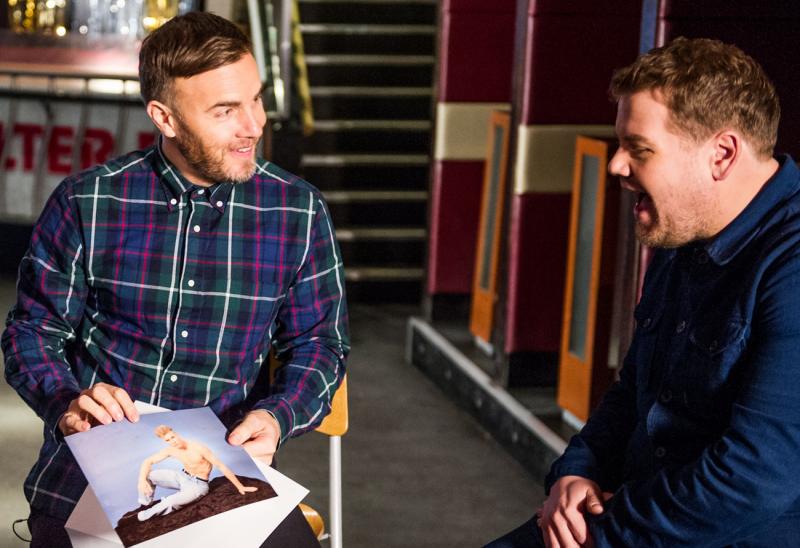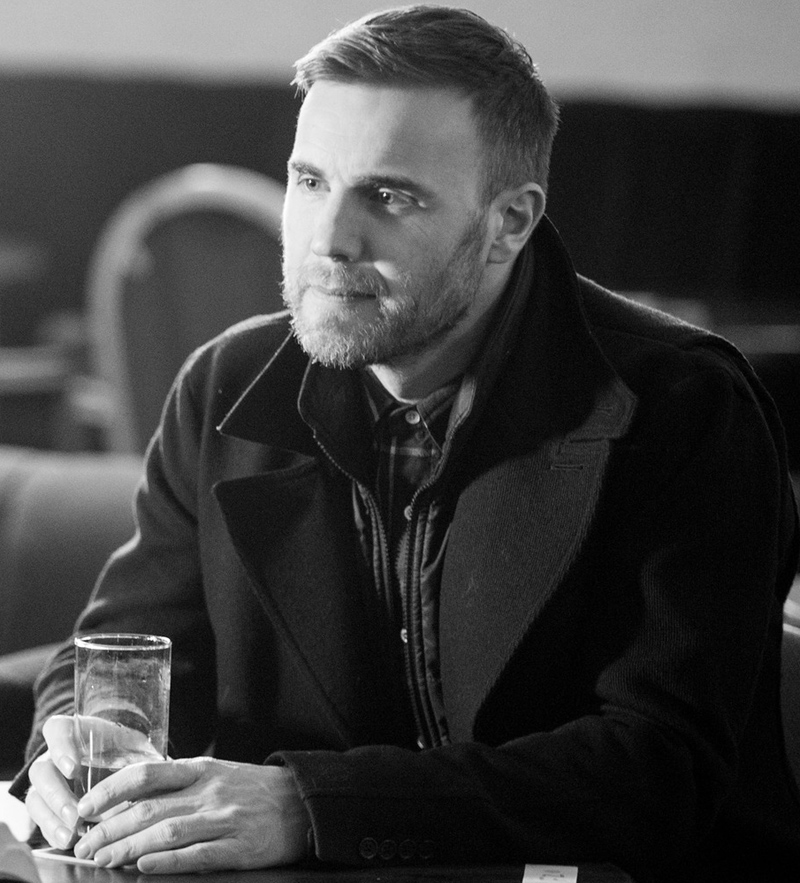When Corden Met Barlow, BBC One | reviews, news & interviews
When Corden Met Barlow, BBC One
When Corden Met Barlow, BBC One
Celebrity schmooze-fest reveals unexpected hidden depths

This had all the makings of a celebrity backslapathon of nauseous proportions, but it turned out to be a painfully touching exploration of the fragility of fame. Not that this means we have to feel sorry for filthy-rich pop stars and happy-chappy light entertainers, but it does mean we have to grudgingly accept that some of them may be human after all.
Corden and Barlow made an improbably well-contrasted pair. Corden came on like a chubby labrador puppy, almost peeing himself with delight at the chance to spend quality time with his favourite pop idol. Barlow remained laconic and slightly lugubrious, absorbing Corden's sugar-rush glee-barrage with an air of practised resignation. As they headed up the motorway in Barlow's Range Rover, aiming for his home town of Frodsham in Cheshire and the Manchester where Take That was born, Corden kept putting Take That songs on the stereo and getting Gary to do dance routines at the steering wheel.
 The mere unvarnished story of Barlow's precocious teenage years playing in working men's clubs was unfeasibly entertaining. Corden had unearthed a blackmail-evoking video clip of Gary performing Michael Jackson's "The Way You Make Me Feel", wearing what looked like a pair of Boy George's old pyjamas and doing a bizarre scissor-kick movement that had the present-day Barlow putting his head in his hands and groaning mournfully.
The mere unvarnished story of Barlow's precocious teenage years playing in working men's clubs was unfeasibly entertaining. Corden had unearthed a blackmail-evoking video clip of Gary performing Michael Jackson's "The Way You Make Me Feel", wearing what looked like a pair of Boy George's old pyjamas and doing a bizarre scissor-kick movement that had the present-day Barlow putting his head in his hands and groaning mournfully.
Footage from the formative days of Take That were yet more incriminating. Corden mercilessly lampooned Barlow's dance-routine costume of tight red cycling shorts with belt, scarf and no shirt, while the publicity photo Barlow had taken of himself to send to prospective agents and managers - lounging topless in jeans, with peroxide-blond hair - would provoke panic stations and an emergency lockdown in this paranoid post-Savile environment.
The heart of the matter, though, was the story of how Barlow went from being the dominant musician in Britain's top boy band Take That, knocking out chart-toppers with an ease reminiscent of Lennon & McCartney or Sir Elton, to a floundering nonentity with Van Gogh's ear for a hit. After Robbie Williams quit the group in 1995 and embarked on a solo career of flabbergasting proportions - remember that story about how his contract with EMI "guaranteed" that he'd break America? - Barlow coolly envisaged himself sailing effortlessly up the US charts. Instead he suffered a catastrophic backlash in which he was written off by fans and media alike (and by a cartoonishly spiteful Robbie), and didn't even have a record deal.
 Barlow was too cocky and took too much for granted, but his account of the ordeal was as harrowing as it was low-key. Lapsing into depression as he saw himself being ridiculed time and again on TV - there was a telling scene where he watched a clip of David Walliams and Matt Lucas sending him up, and his face looked like an Arctic winter - he deliberately gorged on junk food in order to become fat (17 stone) and unrecognisable. Even his beloved white Yamaha piano on which he'd written most of his hits turned against him - "It just didn't talk the way it used to talk," as he put it.
Barlow was too cocky and took too much for granted, but his account of the ordeal was as harrowing as it was low-key. Lapsing into depression as he saw himself being ridiculed time and again on TV - there was a telling scene where he watched a clip of David Walliams and Matt Lucas sending him up, and his face looked like an Arctic winter - he deliberately gorged on junk food in order to become fat (17 stone) and unrecognisable. Even his beloved white Yamaha piano on which he'd written most of his hits turned against him - "It just didn't talk the way it used to talk," as he put it.
Eventually it all turned around, and now Barlow is Britain's Pop Star Emeritus by Royal appointment, close chums with Harry and Wills and king of the celeb-charidee hill (Barlow with Take That at the 2012 Olympics closing ceremony, above). "He's following in my footsteps and I love that," commented Sir Elton, stricken by a catastrophic irony-malfunction. But Corden had saved his best for last, when he wondered aloud whether Barlow's single "Let Me Go" was written in the voice of his daughter Poppy, who was stillborn in 2012? Barlow's thoughtful and unhysterical response did him huge credit, I thought.
Add comment
The future of Arts Journalism
You can stop theartsdesk.com closing!
We urgently need financing to survive. Our fundraising drive has thus far raised £49,000 but we need to reach £100,000 or we will be forced to close. Please contribute here: https://gofund.me/c3f6033d
And if you can forward this information to anyone who might assist, we’d be grateful.

Subscribe to theartsdesk.com
Thank you for continuing to read our work on theartsdesk.com. For unlimited access to every article in its entirety, including our archive of more than 15,000 pieces, we're asking for £5 per month or £40 per year. We feel it's a very good deal, and hope you do too.
To take a subscription now simply click here.
And if you're looking for that extra gift for a friend or family member, why not treat them to a theartsdesk.com gift subscription?
more TV
 theartsdesk Q&A: director Stefano Sollima on the relevance of true crime story 'The Monster of Florence'
The director of hit TV series 'Gomorrah' examines another dark dimension of Italian culture
theartsdesk Q&A: director Stefano Sollima on the relevance of true crime story 'The Monster of Florence'
The director of hit TV series 'Gomorrah' examines another dark dimension of Italian culture
 The Monster of Florence, Netflix review - dramatisation of notorious Italian serial killer mystery
Director Stefano Sollima's four-parter makes gruelling viewing
The Monster of Florence, Netflix review - dramatisation of notorious Italian serial killer mystery
Director Stefano Sollima's four-parter makes gruelling viewing
 The Diplomat, Season 3, Netflix review - Ambassador Kate Wyler becomes America's Second Lady
Soapy transatlantic political drama keeps the Special Relationship alive
The Diplomat, Season 3, Netflix review - Ambassador Kate Wyler becomes America's Second Lady
Soapy transatlantic political drama keeps the Special Relationship alive
 The Perfect Neighbor, Netflix review - Florida found-footage documentary is a harrowing watch
Sundance winner chronicles a death that should have been prevented
The Perfect Neighbor, Netflix review - Florida found-footage documentary is a harrowing watch
Sundance winner chronicles a death that should have been prevented
 Murder Before Evensong, Acorn TV review - death comes to the picturesque village of Champton
The Rev Richard Coles's sleuthing cleric hits the screen
Murder Before Evensong, Acorn TV review - death comes to the picturesque village of Champton
The Rev Richard Coles's sleuthing cleric hits the screen
 Black Rabbit, Netflix review - grime and punishment in New York City
Jude Law and Jason Bateman tread the thin line between love and hate
Black Rabbit, Netflix review - grime and punishment in New York City
Jude Law and Jason Bateman tread the thin line between love and hate
 The Hack, ITV review - plodding anatomy of twin UK scandals
Jack Thorne's skill can't disguise the bagginess of his double-headed material
The Hack, ITV review - plodding anatomy of twin UK scandals
Jack Thorne's skill can't disguise the bagginess of his double-headed material
 Slow Horses, Series 5, Apple TV+ review - terror, trauma and impeccable comic timing
Jackson Lamb's band of MI5 misfits continues to fascinate and amuse
Slow Horses, Series 5, Apple TV+ review - terror, trauma and impeccable comic timing
Jackson Lamb's band of MI5 misfits continues to fascinate and amuse
 Coldwater, ITV1 review - horror and black comedy in the Highlands
Superb cast lights up David Ireland's cunning thriller
Coldwater, ITV1 review - horror and black comedy in the Highlands
Superb cast lights up David Ireland's cunning thriller
 Blu-ray: The Sweeney - Series One
Influential and entertaining 1970s police drama, handsomely restored
Blu-ray: The Sweeney - Series One
Influential and entertaining 1970s police drama, handsomely restored
 I Fought the Law, ITVX review - how an 800-year-old law was challenged and changed
Sheridan Smith's raw performance dominates ITV's new docudrama about injustice
I Fought the Law, ITVX review - how an 800-year-old law was challenged and changed
Sheridan Smith's raw performance dominates ITV's new docudrama about injustice
 The Paper, Sky Max review - a spinoff of the US Office worth waiting 20 years for
Perfectly judged recycling of the original's key elements, with a star turn at its heart
The Paper, Sky Max review - a spinoff of the US Office worth waiting 20 years for
Perfectly judged recycling of the original's key elements, with a star turn at its heart

Comments
Sorry, but the first 12 words